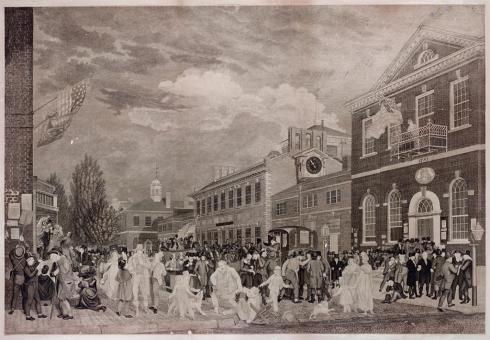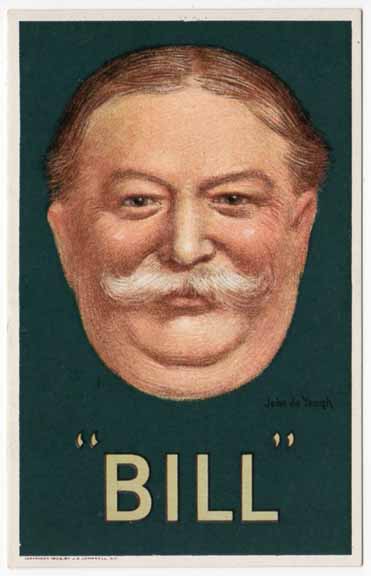I am so very grateful that Election Day is finally upon us. I’ve been living in a world of division over the past many months: divided family, divided household, divided department, divided circle of friends. Facebook has been absolutely unbearable in the last month or so–even more so than normal. Hopefully we can all move on no matter what the outcomes. All this early voting confuses and upsets me: I think it’s adding to the divisiveness. Why can’t we just have one day, Election Day, when we all exercise our civic obligation and privilege at the same time? If it’s a matter of access and opportunity, I would certainly support an Election Day holiday, but I think we should all vote on the same day and then celebrate our ability to vote on Election Night.
I’m very curious about the experience of voting in the past, and the speed by which news of the results reached the electorate. Few of my Americanist colleagues could give me any satisfactory insights into this, and my own knowledge of early modern Europe–and age when kings and queens ruled–is not much help. I imagine that the experience of voting was very different in the cities and the countryside, and that it took weeks, if not months, to know the results before the telegraph and telephone. One colleague suggested we search through a database of early American newspapers to see when the election results reached Salem, and our findings were both predictable and surprising: predictable in the sense that it clearly took several weeks to confirm the election of a president through most of the nineteenth century, surprising in the way they voted–over several days. So there goes my criticism of the supposed “innovation” of early voting. The logistics of democracy are often complicated, then and now.
My research into the mechanics of voting did turn up some great election materials, from a succession of campaigns and elections past, beginning with a lovely banner from one of the most contested elections of all time: the 1800 race between Thomas Jefferson and John Adams. I love this banner from the Smithsonian, and wonder where it was displayed.
My election images are a mixture of materials: from campaigns and periodicals primarily. I would have liked to get inside the polling place, or on the streets just outside, but that was seldom possible. And I’m not even getting close to the present: too divisive. The past is safer.
Two very popular prints: Election Day outside Independence Hall, Philadelphia, 1816, by Alexander Lawson, and James Polk trying to prove he is not pro-Catholic, 1844, both Library of Congress.
The telegraph delivers the results of the 1856 election & a Charles Maurand print of the celebrations following the election of Abraham Lincoln in the streets of New York, 1860, Harper’s Weekly; a metamorphic trade card for the presidential contest of 1876 between Tilden and Grant, Duke University Library Special Collections.
Inside the Polling Place: voting in New York City, 1898 and a Jacob Riis photograph of a mock election, 1890, Museum of the City of New York.
The emergence of public opinion: campaign cards for William Howard Taft and William Jennings Bryan from the 1908 election–before women could vote, of course, and a nation divided between Roosevelt, Wilson and Taft in 1912, Library of Congress.


















November 6th, 2012 at 8:48 am
Jill Lepore has done some work on voting in the American past. Check out http://www.newyorker.com/reporting/2008/10/13/081013fa_fact_lepore
November 6th, 2012 at 9:11 am
Thanks Michelle–someone just emailed me that link–but you were first!
November 6th, 2012 at 9:03 am
Great illustrations – thanks
While I share your feeling about the symbolism of voting all together on one day, I bow to reality.
Here is mine:
when I lived in Boston and worked across town, I often made it to the poling place at the very last minute due to my commute. How nice it would have been to be able to vote early!
Now, in my town in Vermont (where the polls open at 5am) a voter can simply show up at the Town Clerk’s office and vote as soon as the ballot is printed. We voted this way for several years while we were commuting during the week back to our old town and place of employment. We were not here on Election Day. We were earning a living.
More recently we vote early because my husband cannot walk long distances or stand for long time easily and he cannot consider a wheel chair. We still walk into Town Hall, are greeted by name and vote.
My son, the computer whiz, also voted early, as he cannot predict when a crisis will erupt at work. The 5am opening for voting appeals to him, but early voting is easier.
Please be more generous in your assessments.
PS: follow the reading of the Declaration of Independence to see how long it took information to travel in the late 1700’s. Dover, NH, for example, knows exactly which day the Declaration was read at the Friends Meeting House
I was told that the reason for our original spring inauguration was to allow information and people to travel the distances required.
November 6th, 2012 at 9:16 am
Thanks for your response, Jane; of course I was expressing a somewhat idealized view, but I do think the early voting trend is problematic. An election day holiday would be great; absentee ballots are essential. Just my opinion, rather than an assessment.
November 6th, 2012 at 11:42 am
Amen to the divisiveness of this election. I think it has been trending that way for every Presidential elections because (it seems to me) there is a lack of respect for those who disagree. “We’re right. You’re an evil idiot who has no concept of compassion or humanity.”
I’m hoping to have Wednesday be a “media-free” day so I don’t have to listen to both sides whine and kvetch (but I might weaken because I have a fondness for online jigsaw puzzles.)
November 6th, 2012 at 2:32 pm
A media-free day! What a great idea, particularly for tomorrow. There’s going to be a frenzy, no matter what the outcome.
November 7th, 2012 at 10:14 am
I find it very hopeful that everyone on all sides is annoyed at the media and worried about divisiveness.
November 8th, 2012 at 7:14 am
Me too!